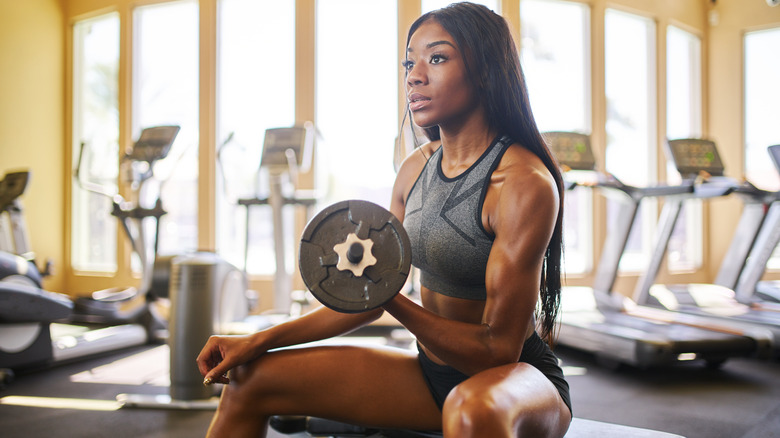How To Choose The Right Dumbbell Weight For Your Workout
Picking the right dumbbell weight is crucial for enjoying the health benefits associated with dumbbells and getting a stellar workout. Regular gym goers seem to select the ideal dumbbell weight with such ease, but for newbies, this can be intimidating. Too much weight can cause serious injuries, while too little weight doesn't challenge your muscles. Whether you're wanting to sculpt your arms and legs with dumbbells or give resistance training a whirl, there's a couple of things you'll want to keep in mind when selecting the right dumbbell weight.
Before you grab a dumbbell, make sure you're warmed up. The goal is to wake up all the muscles you plan on using during your strength-training workout. This will allow you to gauge how much weight your muscles can hold since they're properly fired up, points out Top Fitness. Certified strength and conditioning specialist Aubrey Watts says to focus on "increasing the body's core temperature, mobility, muscle activation, and technical build-up" during your warm-up (per Self). Once your body is warm, you can test out your strength.
As a rule, you'll also want to take your physical shape into account before selecting a dumbbell. For instance, if you're a beginner or recently recovered from an injury, Top Fitness recommends lifting lighter to start. From here, DailyBurn suggests doing a simple test (i.e. a bicep curl set) to see if the weight works for you. If the last few reps are challenging but doable, you've chosen a good weight (via Women's Health).
Choose the weight based on your fitness goal
Believe it or not, there are other ways to choose the right dumbbell weight. Another common way to choose your weight is to base it off of your fitness goals (per Women's Health). According to Wilfred R. Cameron Wellness Center, fitness goals should be personalized, attainable, and should focus on one thing at a time. Think, do I want to boost endurance, or do I want to increase my strength? Once a goal is selected, picking a weight for your workout gets that much easier.
If your fitness goal is to bulk up, consider using heavier weights (via Top Fitness). This will require fewer reps as the weights should be moderately heavy. "The basic principle is to apply a load and overload the muscle so it needs to adapt and get stronger," says certified exercise physiologist Neal Pire to Everyday Health. It's recommended by Women's Health to complete 6-10 reps in 3-6 sets for general strength building. But, if your goal is to get some serious strength gains through lifting, consider using even heavier weights. This is typical for powerlifting and bodybuilding, as they each require significantly heavy weights.
However, if your priority is to tone the body, lighter weights will work well, points out Top Fitness. With lighter weights, you'll also want to focus on more reps during a set. For endurance building, Women's Health suggests doing 10-14 repetitions in 2-3 sets.
Choose the weight based on your workout
If you're unsure of your fitness goal, don't sweat it. Instead, choose the dumbbell weight based on your current workout, explains Top Fitness. For workouts that require lots of reps, lighter weights should work just fine. This also includes core workouts, tricep exercises, shoulder presses, and anything else that raises your arms over your shoulders (per Women's Health).
On the other hand, if there are fewer reps, lift a heavier dumbbell (via Top Fitness). These heavier lifts are frequently associated with lower body muscles according to Women's Health, since that's where the biggest muscles in the body are located. These exercises include squats (front or back) and deadlifts.
At the end of the day, when it comes to lifting, it should fatigue your muscles, regardless of whether it's light or heavy. But if lifting the weight seems impossible and your form starts to suffer, drop the weight down. Form and technique should always be the first concern when lifting, points out personal trainer Cameron Yuen (via Livestrong). Alternatively, if you're pumping out max reps easily and have great form, that may be a sign to add more weight during your next set, shares Ben Booker, a trainer at DailyBurn. This can happen to both rookies and experienced lifters, as the more you lift, the easier the weight becomes. If this happens, pat yourself on the back for a job well done. And don't forget to recover well with proper rest, hydration, and nutrition.



